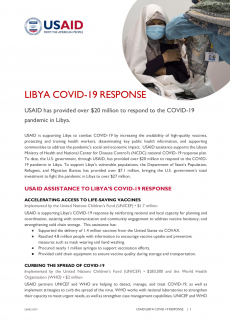USAID has provided over $20 million to respond to the COVID-19 pandemic in Libya.
USAID is supporting Libya to combat COVID-19 by increasing the availability of high-quality vaccines, protecting and training health workers, disseminating key public health information, and supporting communities to address the pandemic’s social and economic impact. USAID assistance supports the Libyan Ministry of Health and National Center for Disease Control’s (NCDC) national COVID-19 response plan. To date, the U.S. government, through USAID, has provided over $20 million to respond to the COVID19 pandemic in Libya. To support Libya’s vulnerable populations, the Department of State’s Population, Refugees, and Migration Bureau has provided over $7.1 million, bringing the U.S. government’s total investment to fight the pandemic in Libya to over $27 million.
ACCELERATING ACCESS TO LIFE-SAVING VACCINES
Implemented by the United Nations Children’s Fund (UNICEF) • $1.7 million
USAID is supporting Libya’s COVID-19 response by reinforcing national and local capacity for planning and coordination, assisting with communication and community engagement to address vaccine hesitancy, and strengthening cold chain storage. This assistance has:
- Supported the delivery of 1.4 million vaccines from the United States via COVAX.
- Reached 4.8 million people with information to encourage vaccine uptake and preventive measures such as mask wearing and hand washing.
- Procured nearly 1 million syringes to support vaccination efforts.
- Provided cold chain equipment to ensure vaccine quality during storage and transportation.
CURBING THE SPREAD OF COVID-19
Implemented by the United Nations Children’s Fund (UNICEF) • $283,000 and the World Health Organization (WHO) • $2 million
USAID partners UNICEF and WHO are helping to detect, manage, and treat COVID-19, as well as implement strategies to curb the spread of the virus. WHO works with national laboratories to strengthen their capacity to meet urgent needs, as well as strengthen case management capabilities. UNICEF and WHO continue to identify the most effective channels to disseminate vital public health information. This assistance has:
- Widely distributed vital health information through radio, television, SMS messages and trusted community leaders reaching millions of Libyans.
- Trained 26 media focal points and health promotion staff from the Ministries of Health and Education, government institutions, and local governments to disseminate public health information to protect at risk communities from the spread of COVID-19.
STRENGTHENING EMERGENCY RESPONSE CAPACITY
Libya Governance and Civil Society Program (LGCS) • Implemented by DAI, LLC • $3.5 million
USAID, through the Local Governance and Civil Society program, locally known as Taqarib, is working with municipalities to improve their emergency-management systems so they can respond quickly to the health and economic consequences of the COVID-19 pandemic. USAID assistance also builds the long-term preparedness of municipalities to overcome other acute threats to public health and welfare. This assistance has:
- Trained 30 partner municipalities and 1,200 people in community emergency response.
- Provided $1 million in equipment to support Municipal Emergency Response Center operations.
- Provided disinfection gear, waste-management equipment, and personal protective equipment for frontline workers benefitting more than 400,000 people.
PROMOTING HEALTH AND SAFETY AMIDST CRISIS
Libya Transition Initiative (LTI) • Implemented by Chemonics, Inc. • $1.64 million
USAID is supporting local civil society organizations (CSOs) and the NCDC to design and produce COVID-19 risk and prevention awareness campaigns. Working with national government agencies and community actors in historically marginalized areas, USAID’s assistance increases access to information, hygiene supplies, and personal protective equipment including in conflict-prone areas highly affected by the virus. This assistance has:
- Supported 18 local CSOs and the NCDC to design, print, and disseminate awareness materials (e.g., billboards, posters, Facebook ads, banners, and videos) reaching millions of Libyans.
- Distributed 10,000 hand-sewn face coverings and 6,000 face shields produced by a local CSO.
- Provided hygiene supplies to Libyan first responders across four medical facilities in southern Libya serving approximately 200,000 people.
PROTECTING THE MOST VULNERABLE
Implemented by UNICEF, IOM, INGO partners • $8.05 million
To address the immediate health needs of conflict-affected and vulnerable Libyans, USAID partners with UN organizations to support risk communication, improve case-management, strengthen infection prevention and control, and provide direct health and social services. This assistance has:
- Reached over 41,000 migrants and internally displaced persons with COVID-19 awareness trainings, personal protective equipment and access to COVID-19 screenings.
- Improved laboratory testing capacity and provided essential medicines and surgical supplies to health care facilities in six target areas benefiting 365,000 people.
- Enabled Libya’s NCDC to provide medical checkups for 77,000 travelers entering Libya monthly.

